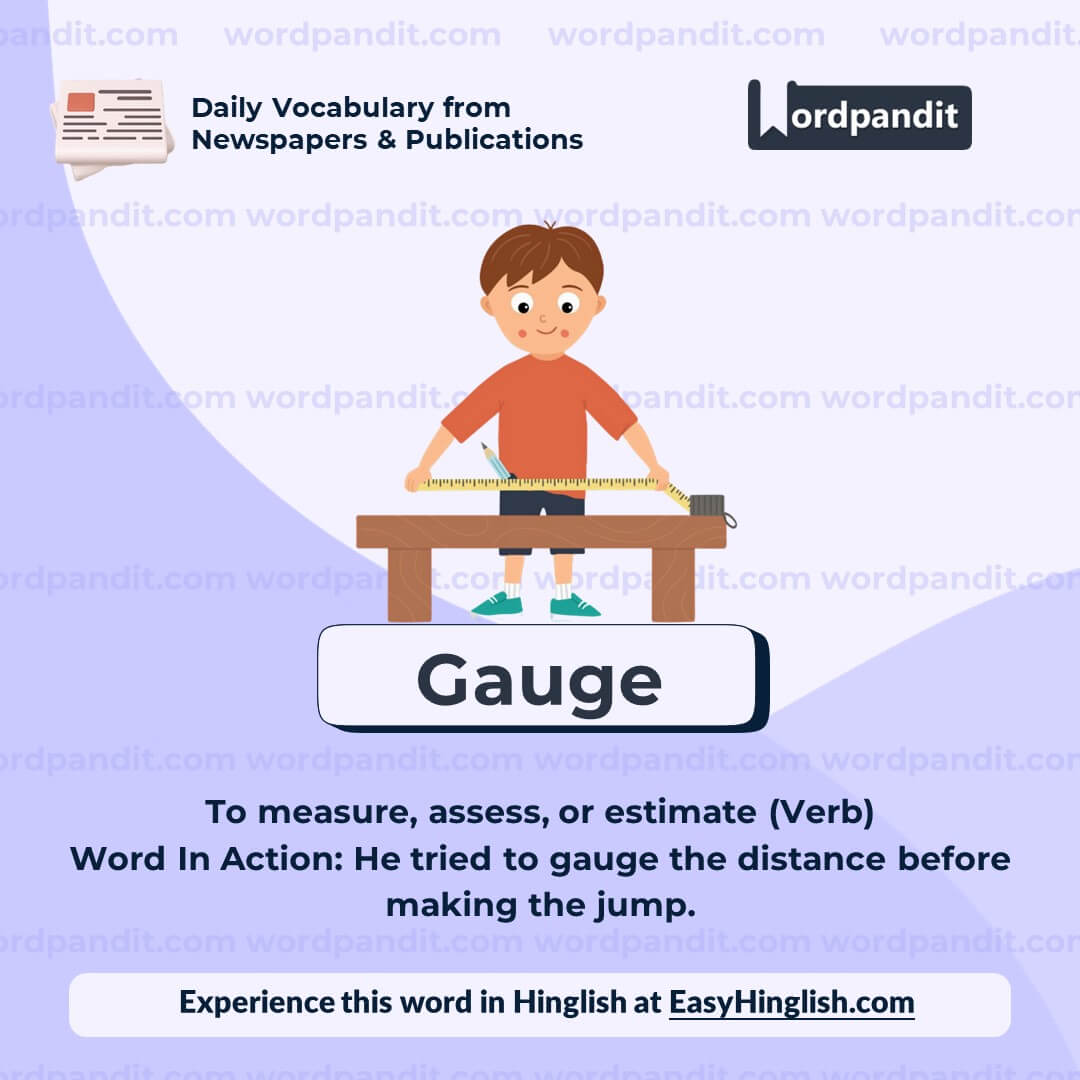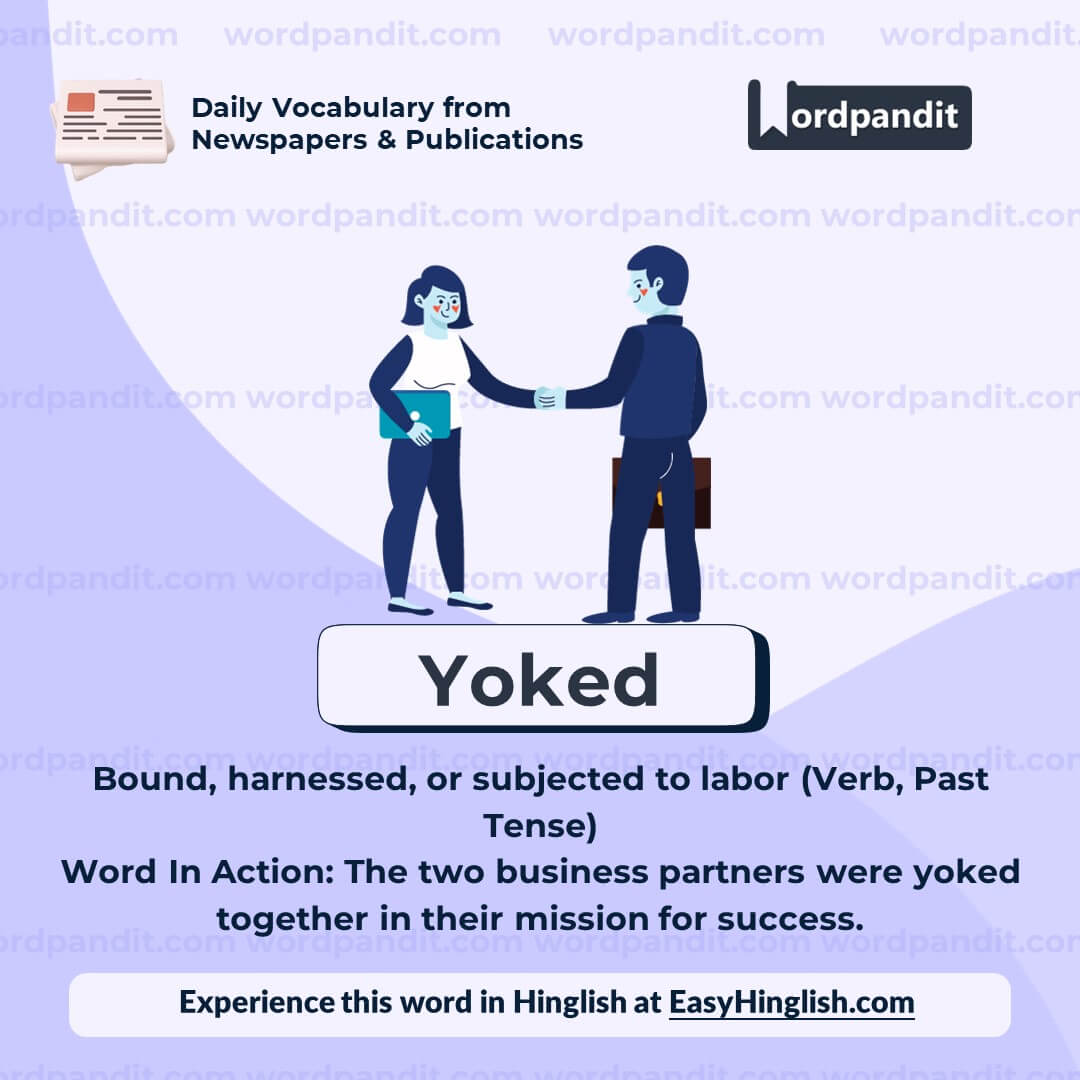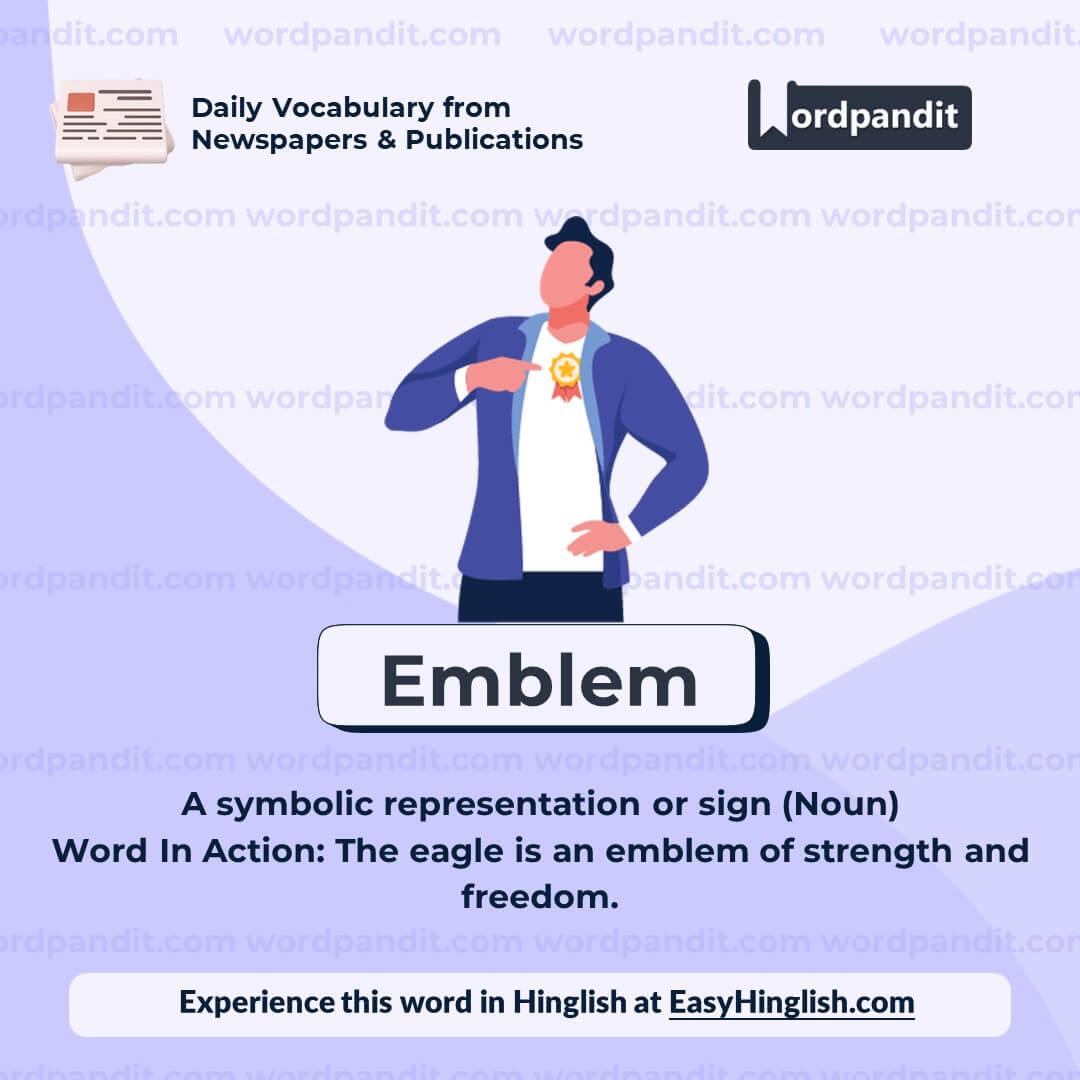Daily Vocabulary from Indian Newspapers and Publications
Welcome to Wordpandit’s Indian Vocabulary Hub
At Wordpandit, we understand the importance of staying rooted in the local context while expanding your language skills. This section focuses on enriching your vocabulary with words and phrases drawn from India’s leading newspapers and publications, ensuring you're learning vocabulary that is practical, relevant, and uniquely Indian.
Why Indian Sources Matter
We believe that the best way to master any language is by immersing yourself in local content. That’s why we carefully curate vocabulary from top Indian publications, including:
- The Hindu
- The Times of India
- The Economic Times
- Hindustan Times
- Live Mint
- The Indian Express
- And many others...
Stay Updated, Stay Relevant
With daily updates from Indian news sources, you’ll be consistently learning words that reflect the trends and shifts in Indian society and culture. Our focus is to provide vocabulary that enhances your understanding of the language in an Indian context.
How Wordpandit Supports Your Goals
Whether you’re preparing for exams, aiming to improve your professional communication, or simply want to stay connected with the latest Indian vocabulary, Wordpandit is here to guide you every step of the way.
Learn with a Practical Approach
Our interactive learning methodology includes real-world examples, engaging activities, and context-specific usage to ensure that every word becomes part of your active vocabulary.
Dive into Indian Vocabulary Today!
Why Choose Wordpandit?
Practical Learning: Focus on words you'll actually encounter in real-world reading, enhancing your comprehension and communication skills.
Diverse Content: From current affairs to scientific breakthroughs, our varied sources expose you to vocabulary across multiple domains.
Effortless Integration: Make Wordpandit a part of your daily routine. Just a few minutes each day can significantly boost your lexicon over time.
Your Path to Vocabulary Mastery
- Visit our Daily Vocabulary section regularly
- Explore new words and their usage in context
- Practice incorporating these words into your own writing and speech
- Track your progress as your vocabulary expands
Start Your Journey Today
Embark on your vocabulary enhancement journey with Wordpandit. By consistently engaging with our daily posts, you'll build a robust vocabulary that serves you well in academic, professional, and personal contexts.
Remember, a word a day keeps linguistic limitations at bay. Make Wordpandit your daily companion in the quest for vocabulary excellence!
WORD-1: Gauge
Context:
"It seems he wanted to gauge the public’s reaction, especially the Sikhs." - New Indian Express
Explanatory Paragraph:
The word "gauge" means to measure, assess, or evaluate something. In this context, it refers to the act of understanding or estimating public opinion, particularly that of the Sikh community. The word is often used when someone is trying to determine the size, amount, or level of something, whether it’s a physical quantity, a person's emotions, or public sentiment.
Meaning: To measure, assess, or estimate (Verb)
Pronunciation: Gayj
Difficulty Level: ⭐⭐⭐ Intermediate
Etymology: The word "gauge" originates from Old French "gauger," meaning "to measure" or "ascertain," and is related to the Frankish word "galgo," meaning "rod" or "measuring stick."
Synonyms & Antonyms:
Synonyms: Assess, evaluate, measure, estimate, determine
Antonyms: Ignore, overlook, disregard
Usage Examples:
- The teacher tried to gauge the students' understanding of the lesson through a quick quiz.
- Before launching the new product, the company conducted a survey to gauge customer interest.
- The pilot checked the fuel gauge to ensure there was enough for the journey.
- It is difficult to gauge someone’s emotions just through a text message.
Cultural Reference:
"Polls are often conducted to gauge public opinion before elections, helping politicians shape their campaigns accordingly." - Political Analysis Report
Think About It:
Why do you think it is important to gauge people's opinions before making major decisions?
Quick Activity:
Think of a situation where you had to gauge someone’s reaction before making a decision. Write a short paragraph describing how you did it and what the outcome was.
Memory Tip:
Imagine a "gauge" on a car dashboard that helps measure speed or fuel. Similarly, "gauge" means to measure or assess something.
Real-World Application:
Businesses often gauge customer satisfaction through surveys, reviews, and feedback to improve their products and services.
WORD-2: Yoked
Context:
"Like others, Savarkar was subjected to them—solitary confinement, to stand for a week with handcuffs; chain-fetters; crossbar fetters . . . ‘work’, diabolically designed to break the prisoner—pounding coir, extracting oil as the bullock does by pushing the shaft round and round the ‘oil mill’ to the point one fainted yoked to the ‘mill’." - The Wire
Explanatory Paragraph:
The word "yoked" refers to being physically or metaphorically bound or harnessed, often in a burdensome way. In its literal sense, it describes animals, like oxen or bullocks, being fastened together with a wooden yoke to pull heavy loads. In the given context, "yoked to the mill" metaphorically illustrates the inhumane labor imposed on prisoners, likening them to animals forced to work under harsh conditions.
Meaning: Bound, harnessed, or subjected to labor (Verb, Past Tense)
Pronunciation: Yohkt
Difficulty Level: ⭐⭐⭐ Intermediate
Etymology: Derived from Old English "geoc," meaning "yoke" (a wooden frame used to join animals for pulling loads), and later evolved to symbolize oppression or heavy burdens.
Synonyms & Antonyms:
Synonyms: Bound, harnessed, enslaved, shackled, burdened
Antonyms: Freed, liberated, unshackled, unburdened
Usage Examples:
- The farmers yoked the oxen together to plow the field.
- Throughout history, many people have been yoked under oppressive rulers.
- She felt yoked to a routine that offered little personal freedom.
- The workers were metaphorically yoked to their exhausting daily grind.
Cultural Reference:
"The phrase 'yoked together' is often used in religious texts, such as in the Bible, where it symbolizes deep bonds, responsibilities, or burdens shared between people or imposed upon them." - The Holy Bible
Think About It:
Can being "yoked" to something ever be positive? Think of situations where being bound to a responsibility or duty might bring fulfillment.
Quick Activity:
Write a sentence using "yoked" in a metaphorical sense. For example, how could someone be "yoked" to their ambitions or personal relationships?
Memory Tip:
Think of a yoke as a physical harness that binds animals together for labor. Likewise, being "yoked" means being tied or burdened by something.
Real-World Application:
The term "yoked" is often used in discussions about relationships, labor, and oppression. For example, people might say they feel "yoked to a demanding job" when they feel trapped by their work.
WORD-3: Unfurl
Context:
"Let us unfurl that resplendent emblem of independence openly." - The Wire
Explanatory Paragraph:
The word "unfurl" means to unfold, spread out, or open something that was previously rolled or folded. It is often used in the context of flags, sails, banners, or even abstract concepts like ideas and emotions. In the given context, "unfurl" symbolizes the act of raising or displaying the national flag proudly, signifying independence and freedom.
Meaning: To open, spread out, or unfold (Verb)
Pronunciation: Un-furl
Difficulty Level: ⭐⭐ Beginner
Etymology: Derived from the prefix "un-" (meaning to reverse an action) and the Old French word "ferlier," meaning "to fasten or tie," indicating the act of releasing something tied or folded.
Synonyms & Antonyms:
Synonyms: Unroll, spread, open, extend, unfold
Antonyms: Fold, roll up, wrap, compress
Usage Examples:
- The soldiers stood proudly as they unfurled the national flag during the ceremony.
- With the wind picking up, the sailors began to unfurl the ship’s sails.
- As the artist spoke, she unfurled her vision for the new mural, inspiring everyone in the room.
- The petals of the flower slowly unfurled in the morning sunlight.
Cultural Reference:
"Unfurling the flag is a significant act in many cultures, symbolizing freedom and unity. On Independence Day, the tricolor is unfurled at the Red Fort in India as a mark of national pride." - Historical Archives
Think About It:
What are some moments in life when you have metaphorically "unfurled" your potential or ideas?
Quick Activity:
Write a short paragraph describing a moment when you saw something being unfurled—be it a flag, a banner, or even a new opportunity in life.
Memory Tip:
Imagine rolling out a carpet or opening an umbrella—just like a flag unfurls in the wind. "Unfurl" always involves something spreading open from a closed or rolled-up state.
Real-World Application:
"Unfurl" is commonly used in patriotic events, literature, and even personal growth discussions. People often speak of unfurling banners at rallies or unfurling new ideas in discussions.
WORD-4: Emblem
Context:
"Let us unfurl that resplendent emblem of independence openly." - The Wire
Explanatory Paragraph:
The word "emblem" refers to a symbol, sign, or representation of a particular idea, quality, or organization. It often holds deep meaning and is used to convey identity, values, or history. In the given context, "emblem of independence" refers to the national flag, which symbolizes freedom, unity, and self-governance.
Meaning: A symbolic representation or sign (Noun)
Pronunciation: Em-bluhm
Difficulty Level: ⭐⭐ Beginner
Etymology: Derived from the Greek word "emblema," meaning "inlay" or "ornament," which later evolved in Latin and Old French to mean a symbolic representation.
Synonyms & Antonyms:
Synonyms: Symbol, insignia, badge, crest, representation
Antonyms: Disguise, obscurity, misrepresentation
Usage Examples:
- The dove is an emblem of peace and harmony across many cultures.
- The Olympic rings serve as an emblem of unity and global sportsmanship.
- The lion on the royal coat of arms is an emblem of strength and courage.
- For many, the national flag is the most powerful emblem of patriotism.
Cultural Reference:
"Emblems have been used throughout history to represent nations, movements, and values. The Great Seal of the United States, featuring a bald eagle, is an emblem of national identity and authority." - Historical Archives
Think About It:
What modern symbols or emblems do you think best represent today's society?
Quick Activity:
Think of an emblem that represents something important to you (a school logo, a national flag, a cultural symbol). Describe its meaning and why it is significant to you.
Memory Tip:
Think of an "emblem" as a badge or a crest, something that stands for an idea or a group—just like how a superhero’s logo represents their identity.
Real-World Application:
Emblems are commonly used in national flags, sports teams, government organizations, and brands. They serve as visual representations of values, history, and identity.
WORD-5: Resplendent
Context:
"Let us unfurl that resplendent emblem of independence openly." - The Wire
Explanatory Paragraph:
The word "resplendent" describes something that is brilliantly shining, dazzling, or magnificently impressive. It is often used for objects, appearances, or atmospheres that radiate beauty and grandeur. In the given context, "resplendent emblem of independence" refers to the national flag, symbolizing its bright, glorious, and proud representation of freedom.
Meaning: Shining brilliantly; splendid in appearance (Adjective)
Pronunciation: Reh-splen-duhnt
Difficulty Level: ⭐⭐⭐ Intermediate
Etymology: From the Latin word "resplendere," meaning "to shine brightly," which evolved into Old French "resplendir" and later into English as "resplendent."
Synonyms & Antonyms:
Synonyms: Radiant, dazzling, magnificent, glorious, brilliant
Antonyms: Dull, lackluster, drab, faded
Usage Examples:
- The bride looked resplendent in her beautifully embroidered red and gold saree.
- The palace, illuminated with golden lights, appeared resplendent against the night sky.
- The garden was resplendent with colorful flowers in full bloom.
- As the sun set over the ocean, the horizon turned resplendent with hues of orange, pink, and purple.
Cultural Reference:
"The Taj Mahal, often described as resplendent, is one of the most breathtaking architectural wonders of the world, known for its pristine white marble and intricate craftsmanship." - Travel & Heritage Magazine
Think About It:
What is the most resplendent thing you have ever seen? How did it make you feel?
Quick Activity:
Describe a resplendent scene from a book or movie that left a lasting impression on you.
Memory Tip:
Think of "resplendent" as "re-splendid"—something that shines and appears splendid in all its glory.
Real-World Application:
The word "resplendent" is often used in literature, fashion, and travel writing to describe something breathtakingly beautiful, such as grand events, landscapes, or elegant clothing.



















